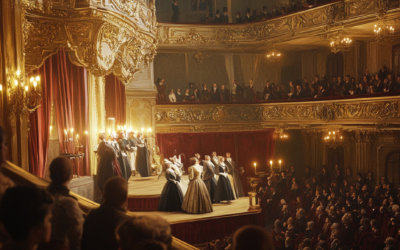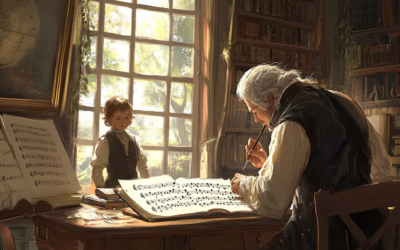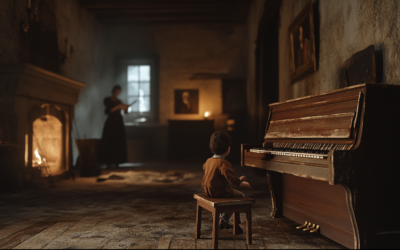Wolfgang Amadé Mozart
From London to Vienna: The Orchestrated Struggles of the Mozart Family
The Mozart family’s journey from London to Vienna was marked by illness, failed opportunities, and the relentless ambition of Leopold Mozart, revealing the pressures and challenges behind the facade of success.
Mozart in Italy: The Untold Story
Was Mozart truly a solitary genius, or was he merely the instrument of his father’s ambition? “Mozart in Italy” challenges the conventional narrative, revealing a complex dynamic between father and son that shaped the course of music history. Prepare to question everything you thought you knew.
“The struggles and setbacks they faced highlight the pressures placed on young Wolfgang and the lengths to which Leopold would go to achieve his goals”
Mozart in Italy
The tale of the Mozarts’ journey from London to Vienna is often recounted as a series of remarkable successes. However, when stripped of the embellishments and exaggerations propagated by Leopold Mozart, a more complex and challenging reality emerges. This journey was marked by illness, failed opportunities, and the relentless ambition of a father determined to craft a legacy for his son.
London: The Harsh Reality Behind the Curtain
In 1764, following their Parisian experience, the Mozart family crossed the English Channel to conquer London. Leopold, ever eager to prove the family’s worth to his friends in Salzburg, seized every opportunity to showcase his children, even in the pubs of London, while awaiting an audience at court. However, this triumphant display was abruptly halted when Leopold fell seriously ill in July, forcing the family into a prolonged stay in Chelsea. During this time, Wolfgang, then just eight years old, composed a series of simple, flawed pieces under the guidance of his sister. These compositions, often lauded as early signs of genius, are rife with errors and demonstrate the limitations of young Wolfgang’s abilities at that time.
The improvisations that Wolfgang and Nannerl performed across Europe, including London, were not spontaneous bursts of creativity, but rather rehearsed and structured pieces. These performances, meticulously planned by Leopold, aimed to impress audiences with flashy scales and arpeggios, but lacked memorable melodies and depth. The often-cited claim that Wolfgang had already mastered composition by this age is contradicted by these rudimentary works, which reveal the struggles and imperfections of a young, developing musician.
Vienna: A City of Missed Opportunities
The next significant chapter in the Mozarts’ travels was their journey to Vienna in 1767. This visit, like their time in London, was plagued by misfortune. The outbreak of smallpox, which claimed the life of Archduchess Maria Josepha of Austria, forced the cancellation of the children’s planned performances at court. Leopold, always seeking to maintain the momentum of his children’s careers, was left frustrated and desperate as Wolfgang fell seriously ill. It took months for him to recover, and by the time the family was able to return to Vienna in early 1768, the initial buzz surrounding the young prodigies had faded.
Wolfgang, though still marketable due to his youthful appearance, was no longer the child wonder who had astonished European audiences. Leopold, undeterred by the setbacks, decided it was time to transition his son from a performer to a composer, even pushing him to write an Italian opera for the Viennese stage. This ambitious plan was Leopold’s way of asserting his and Wolfgang’s capabilities, particularly in the eyes of their skeptics in Salzburg.
The Burden of Ambition
Throughout these travels, Leopold’s relentless ambition is evident. He was determined to elevate his son’s status and secure a place for him in the annals of history, often at the expense of the family’s well-being. The struggles and setbacks they faced in London and Vienna highlight the pressures placed on young Wolfgang and the lengths to which Leopold would go to achieve his goals.
You May Also Like
The Vienna Disaster
The failure of La Finta Semplice in Vienna was a turning point for the Mozart family, revealing the cracks in the facade of Wolfgang’s prodigious reputation and prompting a desperate escape to Italy in search of redemption.
From Innsbruck to Bolzano
From Innsbruck to Bolzano, the Mozart family’s journey was a blend of strategic networking and missed opportunities, revealing the challenges of securing fame in 18th-century Europe.
The Myth of Mozart’s Sight-Reading Genius
Mozart’s so-called sight-reading miracles were less about supernatural talent and more about clever improvisation, as two key 18th-century witnesses make clear.
The Hidden Legacy of Michael Haydn
Mozart’s Symphony No. 37, K.444, is more Haydn than Mozart. How did this happen? A story of deception and misattribution unfolds.
The Myth of Mozart’s Education
For centuries, Wolfgang Amadeus Mozart has been celebrated as a musical prodigy, effortlessly composing masterpieces from a young age. However, when we peel back the layers of myth surrounding his early education, a different picture emerges—one in which his father, Leopold Mozart, plays a far more controlling and influential role than is often acknowledged. This article explores the true nature of Mozart’s education, examining how much of his early works can be attributed to his own genius, and how much was the product of his father’s meticulous and often self-serving guidance. Was Wolfgang’s brilliance entirely his own, or was it a crafted image designed by Leopold?
The Myth of Mozart’s Childhood
Mozart’s childhood is often romanticised, but behind the myth lies a more complex reality. This post explores the hidden dynamics within his family, questioning the traditional narrative of Mozart's early years and shedding light on the forgotten role of his sister,...







